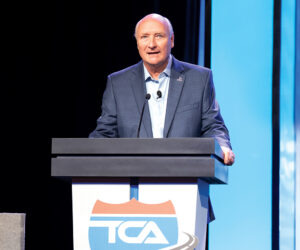John Elliott is a third generation trucking professional. His grandfather — a truck driver — was a strong influence in his life, and his father was successful in key operational roles for numerous large carriers. Elliott began his trucking career at a young age — he was handed a broom and advised to sweep out trailers. Today, after rising through the ranks, Elliott is CEO of his own company — Load One, LLC — and is the 2022-23 chairman of the Truckload Carriers Association (TCA). Like other chairmen before him, Elliott takes the reins as the trucking industry faces the need for resolution to several ongoing critical issues, among them the driver shortage, supply chain issues, and the lack of truck parking. He also assumes the chairmanship as the world faces a new challenge — the war in Ukraine, which has exacerbated already-high inflation and fuel prices and worsened global supply chain pains. Elliott sums up the challenges before him in two words: Very humbling.
Q. Congratulations on taking the helm of the Truckload Carriers Association (TCA). What does it mean to be chairman?
A. Thank you. It is very humbling. Having grown up in the industry, it’s been exciting to experience so many changes over the years. And to now serve as TCA’s chairman and have the chance to lead such an impressive group of officers and top-notch staff is truly an honor. I value the opportunity to not only help tell the story of our industry, from its struggles to its triumphs, but to help shape industry policy. Additionally, I’m honored to work on behalf of the membership — these are all things I love and embrace.
Q. Can you tell the membership a little about your career in trucking and about the company you lead, Load One, LLC?
A. I am the third generation of a trucking family. My grandfather, A.J. Pellegrino, was a coal miner in Pittsburgh and then became a truck driver. He later started a very successful trucking company, Transportation Service, Inc., out of Detroit, Michigan. As I grew up, he was a very strong figure in my life and an incredible mentor to so many in the industry. My father was also successful in key operations roles for numerous large carriers. My first job was in trucking. As a kid, I was handed a broom and told to just go out in the yard and sweep trailers all day during my summer break. From there, I learned basic trailer repair and serviced trucks. When I was in high school, I had the opportunity to work in operations, which I loved. Working for a family company is great, but as many know, it also has a lot of challenges!
While attending college, I was introduced to a new major — aviation management and logistics. I had always loved planes, so I pursued the degree with the intent of starting a career in the air freight industry. After exploring that career path for a few years, a trucking company made me an offer I could not refuse. Just like that, I was right back in trucking operations, serving as an operations manager for Thompson Transport based in Dearborn Heights, Michigan. During my seven years at the company, the fleet size increased from 76 trucks to over 700 after merging with Frederick Transport out of Ontario. During that time at Thompson, I had also become a fleet owner as a side business. After accruing 28 trucks, I determined my side business needed to be my main focus. I devoted the next few years to growing my business as a fleet owner, jumping to 145 tractors leased to three motor carriers. I was an agent for one as well. Finally in 2013 I made the decision to take the biggest risk of all and start my own motor carrier — Load One, LLC.

Q. What do you see as the Top 3 critical issues the trucking industry will face over the next 12 months, and what might be the top strategies for helping solve them?
A. The Top 3 pain points that are impacting our industry are: the driver shortage, supply chain issues, and the lack of truck parking. Each issue is pervasive enough to, like dominos, generate a chain reaction of further problems. According to some reports, the current driver shortage has left the U.S. short 90,000 drivers and has strained supply chains and freight mobility. Supply chain disruptions have limited the availability of purchasable parts and technologies, which causes a vicious cycle where supply chain blocks reverberate down the line. Lastly, the lack of truck parking burdens drivers and inhibits their productivity, at a time when driver retention is more important than ever.
While there are no easy fixes, there are ways we can fight these problems. Truck parking is the most straightforward. We need federal and state government, as well as private industry, to invest in truck parking and infrastructure. In my view, the key to increasing the driver population is incentivizing new drivers, like women, to enter the field and improving overall retention by relieving stressors and increasing job satisfaction. Finally, the supply chain issues will require a larger workforce and targeted investments to bolster areas most affected by supply chain chaos, like the semiconductor and chip sector.
Q, How would you summarize TCA’s just-completed annual convention?
A. It was excellent. I think anyone who attended the event would also give very positive feedback! Not only did we see a bump in our attendance numbers — 1,520 registrants — but we also had representatives from more than 180 carrier companies, which surpassed our goal. This year’s revamped schedule featured meaningful and impactful educational content that was well received. Lastly, the event offered a sold-out, robust exhibit hall that featured lots of networking opportunities and great interaction with our associates.
Q. What specifically does your calendar look like for the next three months?
A. My calendar has always been pretty busy, but this new role takes it up a notch for sure. Shortly after returning from convention, I attended the White House event hosted by President Joe Biden and Secretary of Transportation Pete Buttigieg in early April. What a way to kick off my role as chairman! I plan to spend a good bit of time at the TCA offices working with President Jim Ward and our staff. Also, I am very excited for the upcoming TCA Safety & Security Meeting and Refrigerated Meeting this summer. Definitely make plans for your team to join us!

Q. Share some of the highlights of the agenda for the Safety & Security Meeting, and explain why it’s important for members attend.
A. Building off of a well-attended event last year in St. Louis, with nearly 300 safety professionals, we’re eager for this year’s event set for June 5-7, in downtown Nashville. I’m most excited for our slate of educational sessions that will tackle topics like cargo security, data preservation, DataQs, legal perspectives, and more. In fact, I am one of the panelists for Sunday’s CEO panel that will focus on safety as a retention tool. Also, you won’t want to miss our jam-packed exhibit hall. It will highlight the best innovation our industry has to offer!
Q. As you step into the role of chairman, what is your message to TCA members who are not actively involved in TCA conventions and programs?
A. Honestly, you’re missing out and not taking full advantage of your membership. I would strongly encourage carrier participation — from your leadership and operations staff to your safety and HR departments. It sounds cliché, but there’s something for everyone. Be sure to view TCA’s upcoming events calendar at truckload.org/events.
Q. In early April, President Biden updated the nation on the progress of his Trucking Action Plan designed to improve the nation’s supply chain. The president said 2021 was the best year for trucking, with 35,000 new trucking jobs, and noted that a new plan to expedite the speed at which CDLs were issued had yielded 120,000 new CDLs in January and February. The president also called on the industry to recruit different ethnicities and women. Were you pleased with this progress report?
A. I was pleased that the president is engaging with the trucking industry and is interested in working to solve some of our most critical issues, like the driver shortage. At TCA we agree that 2021 was a great year for trucking, with new levels of success in the face of extraordinary challenges, along with truck drivers deservingly being elevated to essential worker status in the public consciousness.
While we are glad to see progress including new trucking jobs and expedited CDL applicants, we know there is still much work to be done on many fronts. We hope to see action taken to improve supply chain efficiency and strengthen the economy where it’s hurting most, like inflation and fuel prices.
Q. It soon will be six months since Congress approved President Biden’s $1.2 trillion infrastructure plan. Based on conversations TCA has had with Congressional officials and within its own peer groups, is there a substantial chance the plan might actually get off the ground before the midterm election? Also, what is the trucking industry doing to facilitate implementation?
A. While Capitol Hill is generally not known for its speed, there is considerable excitement over putting the infrastructure package to use. Congressional offices rightfully view the infrastructure plan as an unprecedented opportunity to address some of the challenges most affecting their states and districts. TCA staffers recently met with several offices and committees, to advocate appropriate levels of infrastructure spending be allocated toward expanding truck parking — an issue that has plagued the industry for years.
It will be important that the trucking industry help steer the direction of infrastructure investment, as the movement of freight across this country needs adequate and safe roads and bridges. We as an industry know better than most what infrastructure features and geographical areas are most in demand and in need of improvement.
The trucking industry will also need to push for a mindful and forward-looking implementation of the infrastructure plan, one that considers not only the troubles of today, but also tomorrow. The projected growth of freight, with added demand on our electrical grid and increasingly high-risk weather events, are on track to test our national infrastructure in new ways, and we need to be prepared.
Q. Transportation Secretary Pete Buttigieg said at a recent Senate hearing that he is “very concerned” about the lack of truck parking, noting that not only is it a matter of inconvenience for truck drivers but it also becomes an issue of emissions. The lack of truck parking has been an industry topic for longer than we’d like to remember. Do you think Buttigieg’s concern might serve as a catalyst to finally get something done about this issue?
A. Industry leaders and advocates like TCA have been “ringing the bell” on truck parking for some time now. So, certainly it is gratifying to know that Secretary Buttigieg has heard the noise we made and takes this issue seriously. Currently, there is about one truck parking space for every 11 drivers. This leads to added stress, lost productivity and compensation, increased idle time and emissions, and unsafe parking alternatives and outcomes.
TCA is optimistic that under current leadership, the U.S. Department of Transportation (USDOT) will continue to discuss and act on this issue. Secretary Buttigieg provided remarks at our recent convention, where he highlighted the department’s push for city and state governments to apply for USDOT grants to fund much-needed investments in truck parking. As an industry, we should aid this effort by advocating our own local government partners to take this step and thereby prioritize this issue.
Q. The war in Ukraine is having a worldwide impact, and the trucking industry is certainly no exception. What has been the biggest impact — or impacts — on the trucking industry, and how is the industry handling them?
A. First, I want to say that TCA is deeply saddened by Russia’s violent attacks on Ukraine. While it is our role to focus on industry-specific ramifications, we acknowledge that these issues in no way compare to the scale of suffering being afflicted upon the people of Ukraine. Our thoughts and prayers are with them.
With that said, for the trucking industry here in the U.S., Russia’s invasion of Ukraine has exacerbated already-high inflation and fuel prices and worsened global supply chain pains. The world is more connected than ever; sanction-fueled shortages across the globe could rapidly cause massive delays and scarcities here at home.
The most enduring impact for the trucking industry and the nation will be uncertainty. What will be the depth and duration of the war? What are Russia’s global intentions moving forward? What role will the U.S. and its allies play in the new geopolitical landscape? What are the long-term economic effects, and how will they impact trucking?
I can assure members that TCA and its partners remain committed to delivering our members with up-to-date, relevant news and first-rate expert projections to help ease this uncertainty and provide clarity when possible.

Q. The Federal Motor Carrier Safety Administration (FMCSA) is searching for industry stakeholders to join its new Women of Trucking Advisory Board (WOTAB), which has a goal “to recruit, support, and ensure the safety of women commercial motor vehicle (CMV) drivers and the trucking industry at large.” Why is it important that the work of this board be successful?
A. TCA applauds FMCSA’s decision to establish the WOTAB. We are looking forward to working with the advisory board to expand the role women play in the trucking industry, both on our roads and in our offices.
The importance of the board’s work is twofold. First, simply put, it’s important because women deserve better. Improving safety for women in this industry needs to be a top priority. The advisory board can also help lead the effort to ensure women in the trucking industry are not subject to discriminatory practices and disproportionately less pay. Secondly, the board’s work is important because the industry would be better off with more women involved. Women make up less than 10% of the U.S. driver population, and the industry is short over 90,000 drivers. The math is simple — adding more women to the field will help address the shortage. Also, carrier and vendor operations and leadership would undoubtably benefit from a larger, more comprehensive talent pool.
Q. Finally, as you assume the chairmanship, what excites you most about the year ahead?
A. That is a tough one. Aside from being eager to work more closely with the TCA officers and staff, I’m looking forward to talking with members, receiving their input on industry and association initiatives, and continuing to work with our government affairs team and lobbyists on advancing the critical issues. It’s imperative that we also engage with other trade organizations and partners on common issues and goals. Last, but certainly not least, our membership continues to grow — and we have positive energy as an association, so I want to continue to build on that momentum. We must keep pushing it to the next level. I guess you could say I am just pretty excited overall about everything trucking and TCA! I hope you are as well.
Lyndon Finney’s publishing career spans over 55 years beginning with a reporter position with the Southwest Times Record in Fort Smith, Arkansas, in 1965. Since then he’s been a newspaper editor at the Southwest Times Record, served five years as assistant managing editor of the Arkansas Democrat-Gazette in Little Rock and from November 2004 through December 2019 served as editor of The Trucker. Between newspaper jobs he spent 14 years as director of communications at Baptist Health, Arkansas’ largest healthcare system. In addition to his publishing career he served for 46 years as organist at Little Rock’s largest Baptist church.











